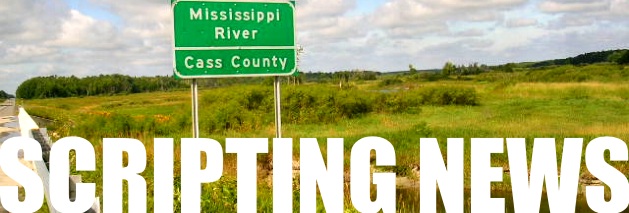
 Wikipedia and explainers
Wikipedia and explainers Jay Rosen talks about the idea of explainers.
 People say they use Wikipedia as the source of explainers. I realize I do too. Now the question is this -- is Wikipedia the best we can do? Because what it does is necessary.
People say they use Wikipedia as the source of explainers. I realize I do too. Now the question is this -- is Wikipedia the best we can do? Because what it does is necessary.
For example, in my previous piece, I wanted to link to an explainer about woodwinds. If there was a good one, I wouldn't have to say anything more, which as a writer I appreciate. As a reader I appreciate it too. The link is much better than a one or two sentence inline summary. Maybe I'll find the topic very interesting and want to explore it in more than a passing way. So a link to a good explainer is a great deal. Esp if it presents the information in a tiered way. First the two-sentence explainer. Then a little deeper. Then finally full depth.
When I saw the Wikipedia page on woodwinds, I thought to myself that we can do much better than this.
The most important thing about woodwinds, imho, that you need to say right up front in a clear and visual way, is there are two families of woodwinds, flutes and reed instruments. That way if you know your instruments but not the classes, you've got everything you absolutely need to know what the term means. At least that's what I was looking for from the explainer.
I would like to see that communicated both in words and in an illustration with pictures of all the instruments, in a format that could be clipped and pasted into my story (with a link back to the article of course).
The value of Wikipedia is they've got an editorial system that millions of people use, and a process that gets some remarkably good reference information in one place where you need it. But the presentation lacks something, and honestly, their vetting process lets some pretty egregious stuff through. And unless you're committed to constant online bickering, you can't easily add your knowledge to the base.
Wikipedia is good for where we are now. But it isn't as good as we can do.
 It's not all mobile
It's not all mobile I've heard a lot of the insiders in Silicon Valley say everything is mobile now. But what does that mean?
The protocol of mobile is LTE and GSM and whatever. I don't know them all because it's not my world.
The protocol of not-mobile is wifi and ethernet.
It all runs over TCP to connect between nodes.
So we're good on that count. There is no wall separating mobile and not-mobile. Except for screen size and no-keyboard, you could just as easily be coming from a desktop PC.
And screen size isn't really a differentiator so much. I use an iPad more since I sprung for the LTE version. If I have a choice between using a map on the iPad or my Android phone, there's no choice. And the Internet access is faster on the iPad.
Also, I think wifi is going to get stronger and more pervasive, and that's great. Because, by accident, we have a worldwide communication standard with complete interop. Your wifi devices work everywhere. How the heck did that happen! ![]()
So, I want to know, is my iPad even a mobile device?
Think about this. I'm typing this at my desk on a huge screen iMac with a second huge screen right next to it. On the nightstand is an iPad charging up. How do they get to the Internet? The same way -- wifi. Not really that much difference. Yet one is supposed to be mobile, and the other isn't. Is that an important distinction? Not so sure.
I've lately discovered the voice recognition system on Android and the iPhone. They're fairly good. You rapidly speak your message, then go back over it and correct the big errors and send it. I've found that a lot of people I communicate with weren't aware that the iPad had this capability. And that helps make up for the hard-to-use virtual keypad.
I'd say we're getting close to an equilibrium here. I would start designing systems for people who have both a phone and an iPad-size device. An app like Cylemeter is perfect for iPhone. It wouldn't add anything to put it on an iPad, except a lot of bulk, which is something I don't need when I'm cycling. Yet I love to have an accurate readout of my daily ride, to compare with rides of previous weeks. I also use the iPhone for music. But maps -- that's all iPad.
So I think we're looking at a scale of devices. In an orchestra you have picolos, flutes, oboes, clarinets and bassoons. They're all woodwinds, played in similar ways, and produce similar sounds. But you use them differently.
Finally, the way you think about this is about to bend. When Apple releases their next TV product, they're going to ask you to look at that space differently. Some people are already using a prototype, AirPlay. But that's not a mobile place. The screen is huge, too heavy for most people to lift, much less put in your pocket. But the kinds of visual ideas it can present blow away any device you have now. So as soon as that happens, no one will be saying "it's all mobile."
The correct answer is there are contexts to network use, and software should not just be aware of it, but be clever about it.